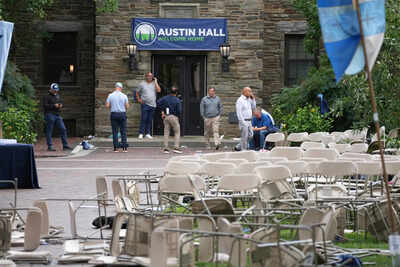ARTICLE AD BOX

In the previous week, Villanova University was plunged into chaos twice in just a few days when back-to-back active shooter alerts triggered lockdowns, evacuations, and widespread panic—only to be declared false alarms.
Recently, the University of South Carolina faced a similar ordeal after a viral video wrongly identified a man holding an umbrella as a gunman, sending students scrambling for safety.These incidents underscore a growing crisis: the surge in false active shooter alerts and their deep psychological and operational impact on American campuses.
Psychological fallout of false alarms
Beyond the immediate disruption, experts warn of lasting mental health repercussions.
Psychologists point to a phenomenon known as “alert fatigue,” where repeated false warnings erode the sense of urgency. The result: rising anxiety, distrust, and emotional exhaustion among students, many of whom admit to feeling on edge long after the “all clear” is sounded.The danger is clear. When every alarm feels like another mistake, the instinct to respond to a real threat weakens, a potentially fatal lapse in an actual emergency.
Eroding trust and the risks it brings
Campus safety relies on trust. Repeated false alarms threaten to unravel that trust, creating a “boy who cried wolf” scenario with real-life stakes. Experts caution that delayed reactions during a genuine active shooter event could cost lives, turning what was once a fable into a modern security nightmare.
Universities struggle to balance readiness and wellbeing
Institutions like Villanova and South Carolina now face an impossible equation: act fast to protect lives or risk fueling panic through false reports.
Their responses include ramping up social media monitoring to stop misinformation before it spreads and expanding mental health resources for students shaken by repeated scares.Still, administrators admit that confidence is fragile, and restoring calm amid a climate of fear is proving harder than anticipated.
Building a resilient, informed campus culture
Experts agree the solution lies in transparent communication, trauma-informed training, and embedding mental health care into emergency protocols.
Universities are being urged to invest in smarter alert systems that reduce false triggers without compromising speed. Equally critical: educating students on how to respond under stress without succumbing to panic or apathy.
A call to act before trust collapses
False active shooter alerts are not just disruptions—they are a mounting mental health crisis and a potential security liability. The scares at Villanova and the University of South Carolina serve as a warning: unless schools address this issue head-on, the next alert could be the one students ignore—and that hesitation could prove deadly.



.png)
.png)
.png)
















 4 days ago
5
4 days ago
5









 English (US) ·
English (US) ·